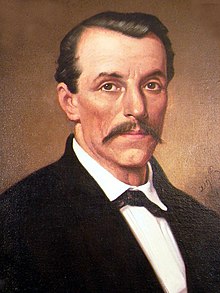Bruno Carranza
| Bruno Carranza | |
|---|---|
 |
|
| President of Costa Rica | |
|
In office April 27, 1870 – August 8, 1870 |
|
| Preceded by | Jesús Jiménez Zamora |
| Succeeded by | Tomás Guardia Gutiérrez |
| Personal details | |
| Born |
José Bruno Carranza Ramírez October 5, 1822 San José, Costa Rica |
| Died | January 25, 1891 (aged 68) San José, Costa Rica |
| Spouse(s) | Gerónima Montealegre Fernández |
| Religion | Roman Catholic |
José Bruno Carranza Ramírez (October 5, 1822 – January 25, 1891) was briefly President of Costa Rica (albeit with the title Temporary Head of the Republic) in 1870. Bruno Carranza came to power in the coup d'état of 27 April 1870 that deposed President Jesús Jiménez. He resigned three months later.
His parents were Miguel Carranza Fernández (Vice-Head of State between 1838 and 1841) and Joaquina Ramírez y García. In 1847 he married Gerónima Montealegre, sister of President José María Montealegre Fernández. His great-great-granddaughter is actress Madeleine Stowe.
Carranza graduated in medicine from the University of San Carlos in Guatemala.
After returning to Costa Rica he practiced both privately and in the State-run Hospital San Juan de Dios. He was inspector general of vaccinations and proto-medicines. He served in Nicaragua as a military doctor during the 1856 Campaign against William Walker, but had to return almost immediately due to a Costa Rican Army retreat and a cholera epidemic.
He also worked as a journalist, publishing several newsletters and newspapers such as El Álbum ("The Album") and La Estrella del Irazú ("The Irazú Star"). He was also active in other diverse economic and commercial ventures, and among other businesses he owned coffee plantations, a book store, and a boutique. From 1855 to 1859 he was awarded the administration of the National Liquor Factory and thus became the only official State supplier of alcohol.
He was deputy for several periods under the Mora Porras administration. He became the Costa Rican ambassador to El Salvador in 1857. He represented San José in the Constituent Assembly of 1869, although he stepped down soon after his election. Politically he was considered a liberal, sometimes even anti-clerical, and was exiled more than once because of his political beliefs.
...
Wikipedia
